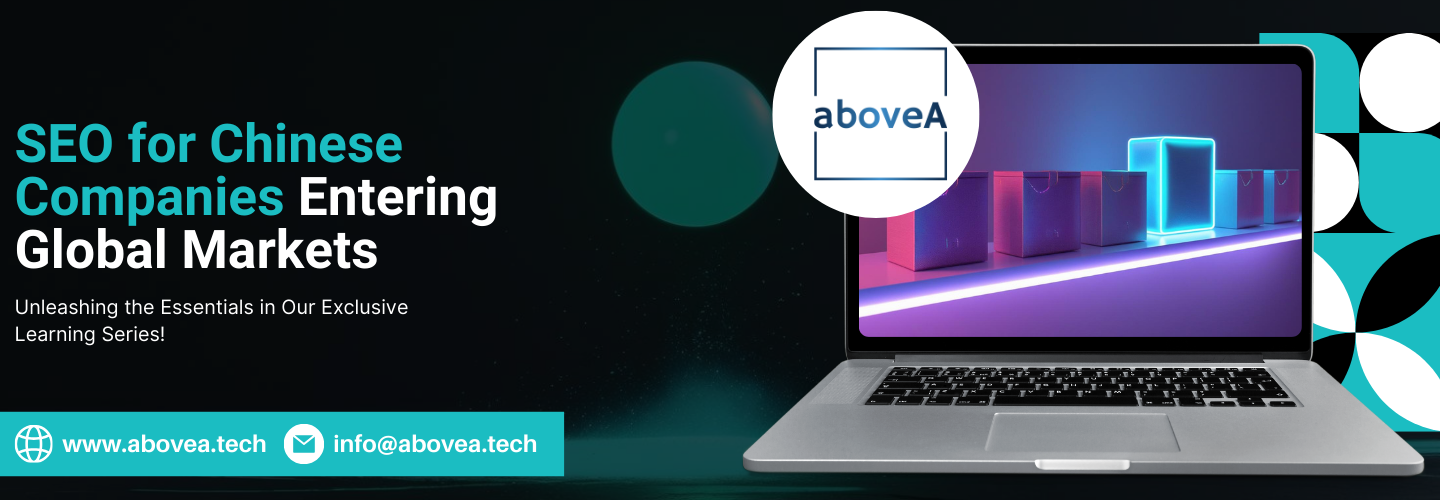

Karina Kavaleuskaya
She combines a passion for storytelling with a strategic mindset to help brands grow, stand out, and connect deeply with their audiences. Through thoughtful, impactful writing, she turns complex ideas into clear, engaging narratives that drive results.
SEO for Chinese Companies Entering Global Markets
SEO for Chinese companies entering global markets is very different from optimizing for Baidu inside China. While Baidu dominates domestic search, it offers little value once a company expands abroad. In 2025, international growth depends on adapting to Google, Bing, and other regional platforms.
For Chinese companies, this shift is both a challenge and an opportunity. Ranking high on Baidu won’t make your brand visible in Europe, the U.S., or Southeast Asia. To succeed globally, businesses need a global SEO strategy China can use to compete on the world stage. This article explains why Baidu SEO doesn’t help outside China, and what steps Chinese brands must take to succeed internationally.
Ready to Grow Beyond China? Unlock Global SEO with aboveA
Table of Contents
Why Baidu SEO Doesn’t Work Outside China?
One of the biggest limitations of Baidu SEO is that it simply doesn’t work once a brand leaves China. Baidu dominates domestic search, but its influence stops at the border. In markets like the U.S. and Europe, Google controls over 90% of searches, while Bing, Yahoo Japan, and Naver dominate in their own regions. Ranking first on Baidu won’t bring visibility to global buyers.
Another issue is algorithm differences. Google SEO vs. Baidu SEO highlights this gap clearly. Baidu emphasizes keyword density and Chinese backlinks, while Google rewards user experience, high-quality content, and international authority sites. Without adapting, Chinese companies entering global markets lose visibility.
Finally, Baidu is tied to Chinese platforms like WeChat and Weibo, which don’t boost rankings abroad. For international SEO for Chinese brands, success requires shifting to Google, Bing, and localized strategies.
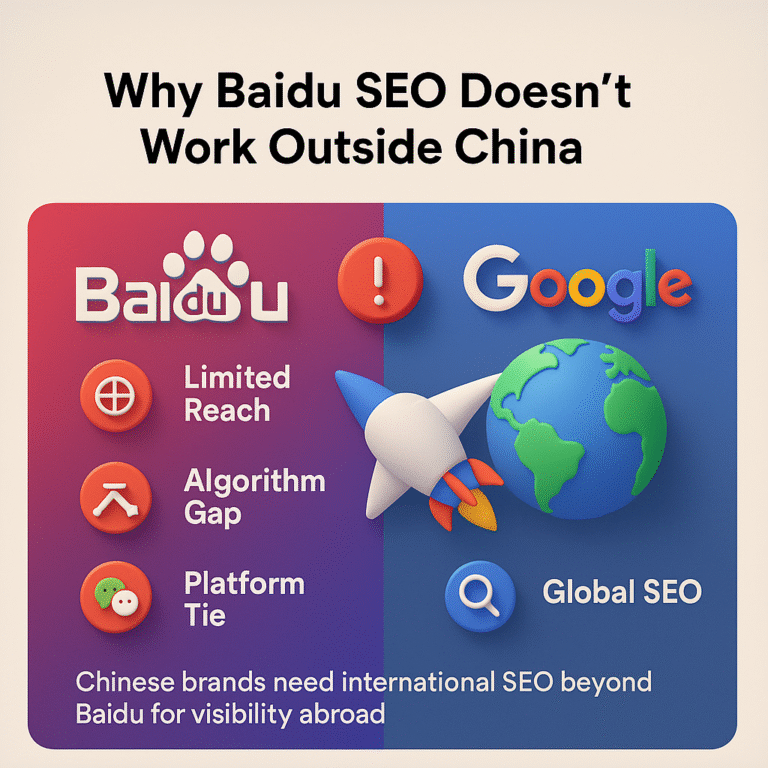
Understanding Global SEO Platforms
hFor Chinese companies expanding abroad, visibility depends on more than Baidu. A strong global SEO strategy that China can follow must include search engines that dominate international markets.
Google and Bing: Core of Global SEO
Google is the global leader, controlling over 90% of searches in the U.S. and Europe. Success here means adapting to Google’s algorithm, which values structured data, authority backlinks, and content quality. The differences between Google SEO vs Baidu SEO are clear, Google prioritizes user experience and long-term trust, while Baidu focuses more on keyword density and Chinese-language platforms.
Bing is smaller but still important, especially in the U.S. and UK. It also powers Yahoo searches, meaning its reach extends further than most Chinese companies expect. Optimizing for Bing involves refining metadata, improving site speed, and ensuring mobile compatibility.
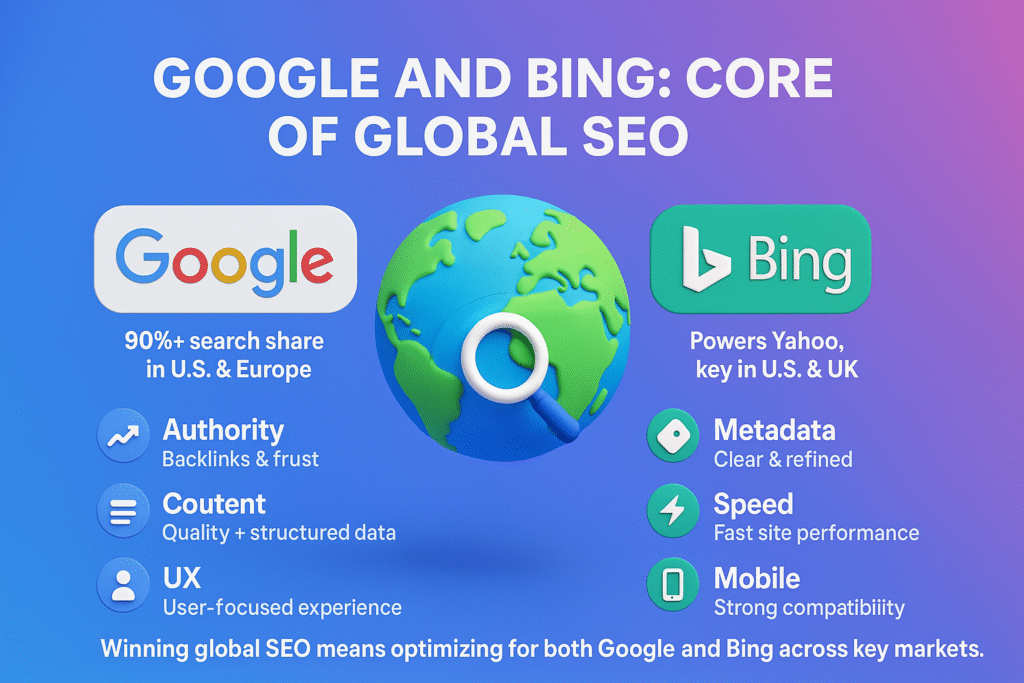
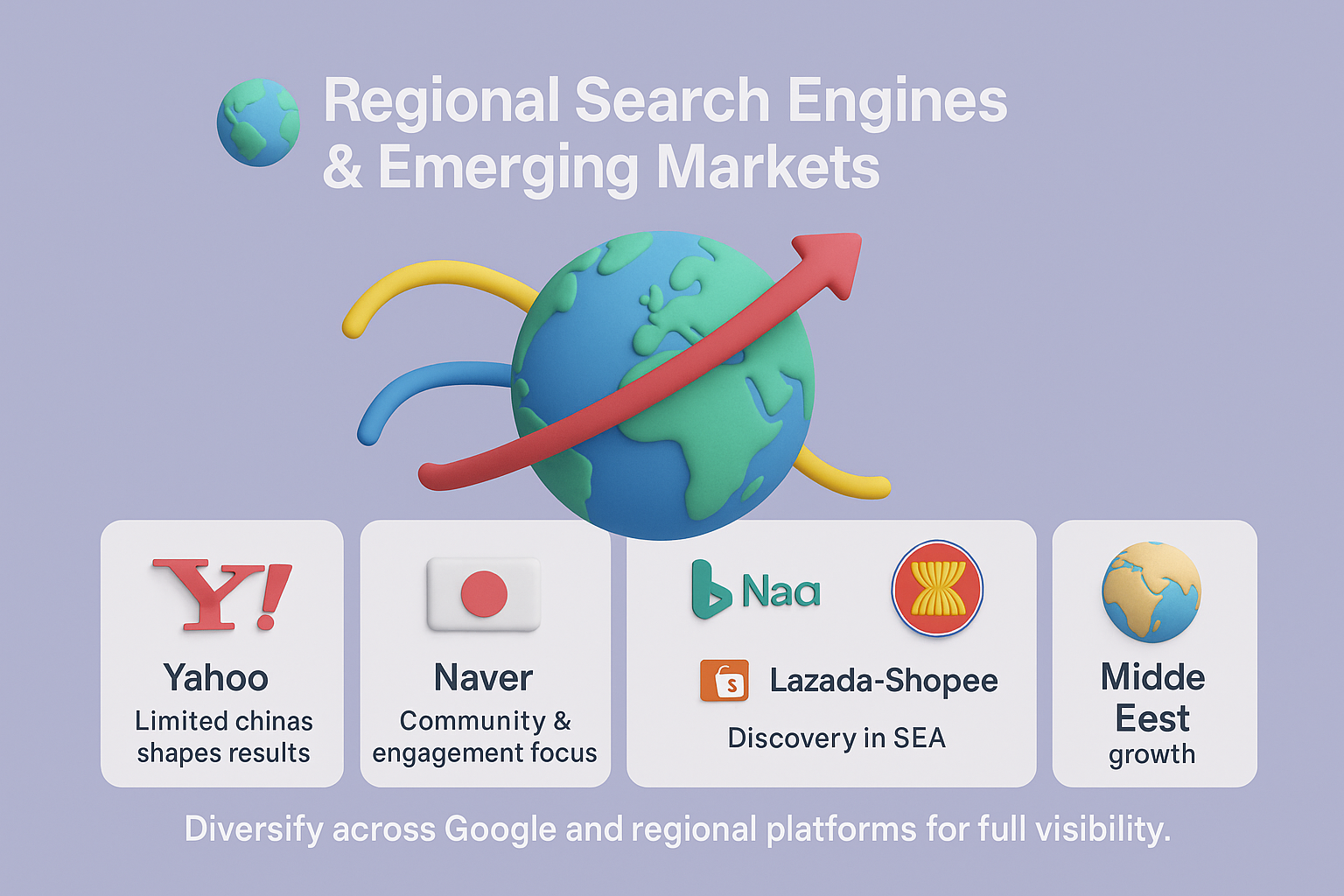
Regional Search Engines and Emerging Markets
While Google and Bing dominate globally, other engines matter in specific regions. In Japan, Yahoo Japan is widely used, though its algorithm runs on Google. Local culture, however, shapes what ranks best. In South Korea, Naver remains strong, and its platform rewards community engagement alongside technical SEO.
Emerging regions like Southeast Asia and the Middle East bring additional complexity. Buyers often search through e-commerce platforms like Lazada and Shopee, which act as discovery engines. For international SEO for Chinese brands, these markets offer untapped growth if companies adapt strategies.
In short, no single engine drives global traffic. Chinese companies going international must diversify. By combining Google optimization with regional search tactics, they ensure visibility and build credibility in every target market.
Building a Global SEO Strategy for Chinese Companies
Ranking on Baidu proves little once a brand leaves China. Success abroad requires a clear global SEO strategy China can adopt, focused on localization, technical adjustments, and market-specific tactics.
Website Localization and Technical SEO
For international SEO for Chinese brands, localization is the foundation. Websites need to look, feel, and function naturally for local users. That means:
Multi-language SEO best practices – creating content in English, Spanish, French, and other target languages. Direct translations rarely work; localized content improves trust and engagement.
Currency and UX adaptation – showing prices in local currency, using familiar checkout systems, and ensuring fast load times across regions.
Hreflang tags – signaling to Google which version of a page is meant for which language or region. Without this, duplicate content issues can block rankings.
Mobile-first design – global consumers often shop on mobile, and search engines reward responsive design.
A technically strong site shows global audiences that your brand is credible and ready for business.
Building SEO for Cross-Border E-Commerce
For many Chinese businesses, cross-border sales begin with platforms like Amazon, Lazada, or Shopee. But SEO for cross-border e-commerce requires blending marketplace optimization with owned websites.
Key strategies include:
Optimizing product listings – using local keywords, clear images, and customer-focused descriptions.
Localized content hubs – publishing blogs, buying guides, and FAQs that rank for intent-driven searches in each market.
Structured data and schema – improving visibility in Google search results with rich snippets.
Speed and security – global buyers expect smooth checkout and safe payment methods.
A global SEO strategy that China can apply means thinking beyond short-term campaigns. Instead, it focuses on long-term visibility across search engines and marketplaces, backed by strong technical SEO and localized messaging.
Chinese companies that make these adjustments not only drive traffic but also build brand trust in competitive global markets.
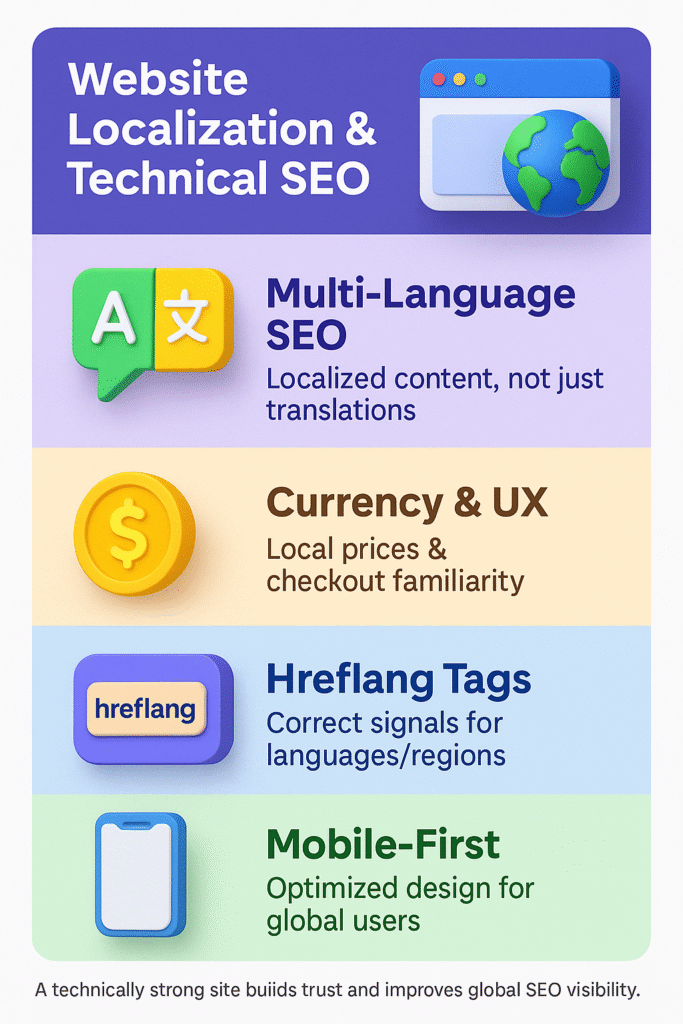
Content Strategy for International Growth
Content is at the heart of SEO. For Chinese companies entering new markets, strong content can make the difference between visibility and invisibility. A clear global content strategy builds authority, trust, and long-term organic traffic.
Localized SEO Content
Publishing in Mandarin works on Baidu, but localized SEO content is essential outside China. Global buyers search in their own languages, using region-specific keywords. To succeed, brands must:
Research local keyword trends in each market, not just translate Chinese keywords.
Adapt tone, cultural references, and examples so they feel natural to the target audience.
Create content formats that global search engines reward, including long-form guides, FAQs, and resource hubs.
For instance, a Chinese electronics brand entering Europe may require English blog posts that compare products, provide tutorials, or offer “best laptops for students” guides. This approach aligns with international content marketing for Chinese companies that want to build credibility.
Content Marketing for Cross-Border Growth
Content does more than drive clicks; it nurtures trust. A strong global content strategy should cover the entire buyer journey, from awareness to decision-making. This means producing:
Educational blog posts to capture early interest.
Case studies and testimonials to show credibility.
Product videos and social content for higher engagement.
Location-specific landing pages to improve rankings in local searches.
Search engines like Google value freshness and authority. Regularly publishing relevant articles signals reliability and increases ranking potential.
For Chinese brands going global, content also acts as a bridge. It explains product value in ways local buyers understand, while boosting visibility in search. Done consistently, this strategy transforms a company from an unfamiliar foreign brand into a trusted local option.
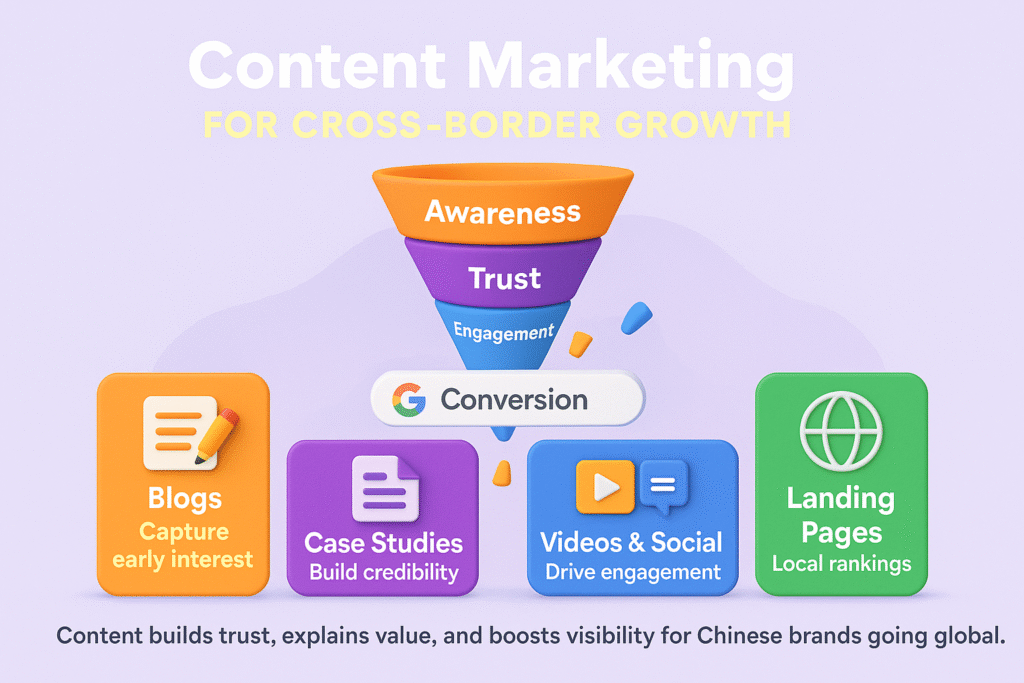
Link Building and Authority Outside China
Backlinks that help on Baidu rarely have impact on Google or Bing. For international growth, Chinese brands must build a global link building strategy that strengthens domain authority in new markets. Search engines reward sites with credible references from local, relevant domains. Without these, rankings abroad remain weak, even if Baidu performance is strong.
The table below shows how backlinks differ in value between markets:
| Market | Backlink Sources | Effectiveness | Best Approach |
|---|---|---|---|
| China | Baidu directories, Chinese blogs | Works locally but not abroad | Focused on domestic SEO only |
| Global | News sites, industry blogs, partner websites | Builds authority across markets | Backlinks for international SEO using PR and guest posts |
| Cross-Border E-Commerce | Marketplace reviews, influencers | Improves trust with buyers | Partnerships, product mentions, affiliate programs |
To grow visibility, brand authority for Chinese companies must come from press coverage, guest content, influencer mentions, and credible local sources. These links act as trust signals, showing search engines and customers that the brand belongs in global markets.
The table below shows how backlinks differ in value between markets:
Tracking SEO Performance Globally
Expanding abroad means tracking results beyond Baidu. Without accurate reporting, it’s impossible to know if campaigns are working. Effective SEO analytics for Chinese brands must cover traffic, rankings, and conversions across multiple regions.
Key tools and methods to track SEO performance globally include:
Google Analytics 4 (GA4): Tracks user behavior across countries and shows which markets bring the highest conversions.
Google Search Console: Identifies search queries, impressions, and clicks for each region.
Bing Webmaster Tools: Provides insights for visibility on Bing and Yahoo searches.
Cross-border SEO reporting: Custom dashboards that segment data by market, language, and channel.
Local conversion tracking: Measures sales, sign-ups, or leads to ensure SEO drives real business growth.
Chinese companies must also monitor bounce rates, site speed, and user engagement across different countries. These signals influence rankings on Google and Bing.
By combining these tools, businesses get a clear picture of how well their global SEO strategy is performing. More importantly, it ensures resources are focused on regions delivering the strongest return on investment.
Cost of Global SEO vs. Paid Ads
When Chinese companies enter new markets, the first question is often about cost. Should they invest in SEO or rely on paid ads? Both can drive results, but the returns look very different.
SEO vs paid advertising for Chinese brands is about short-term speed versus long-term growth. Paid ads on Google, Meta, or TikTok deliver quick traffic but stop the moment budgets run out. SEO takes longer to build but creates a steady flow of free, organic visitors.
Here’s how the two approaches compare:
| Factor | Global SEO | Paid Ads |
|---|---|---|
| Initial Cost | Moderate, focused on content + technical setup | High, depends on CPC in each market |
| Timeline | 3–6 months for results, grows over time | Immediate traffic within hours |
| Sustainability | Long-term ROI, compounding visibility | Ends as soon as ad spend stops |
| Trust Factor | Higher, since organic rankings signal credibility | Lower, as many buyers skip ads |
| Best For | Companies building global presence and brand equity | Testing markets quickly or running time-sensitive campaigns |
For a lasting global SEO strategy, China can use SEO, which almost always brings more substantial returns. Paid ads still matter, but work best when combined with SEO for balance.
Key Statistics and Trends in Global SEO for 2025
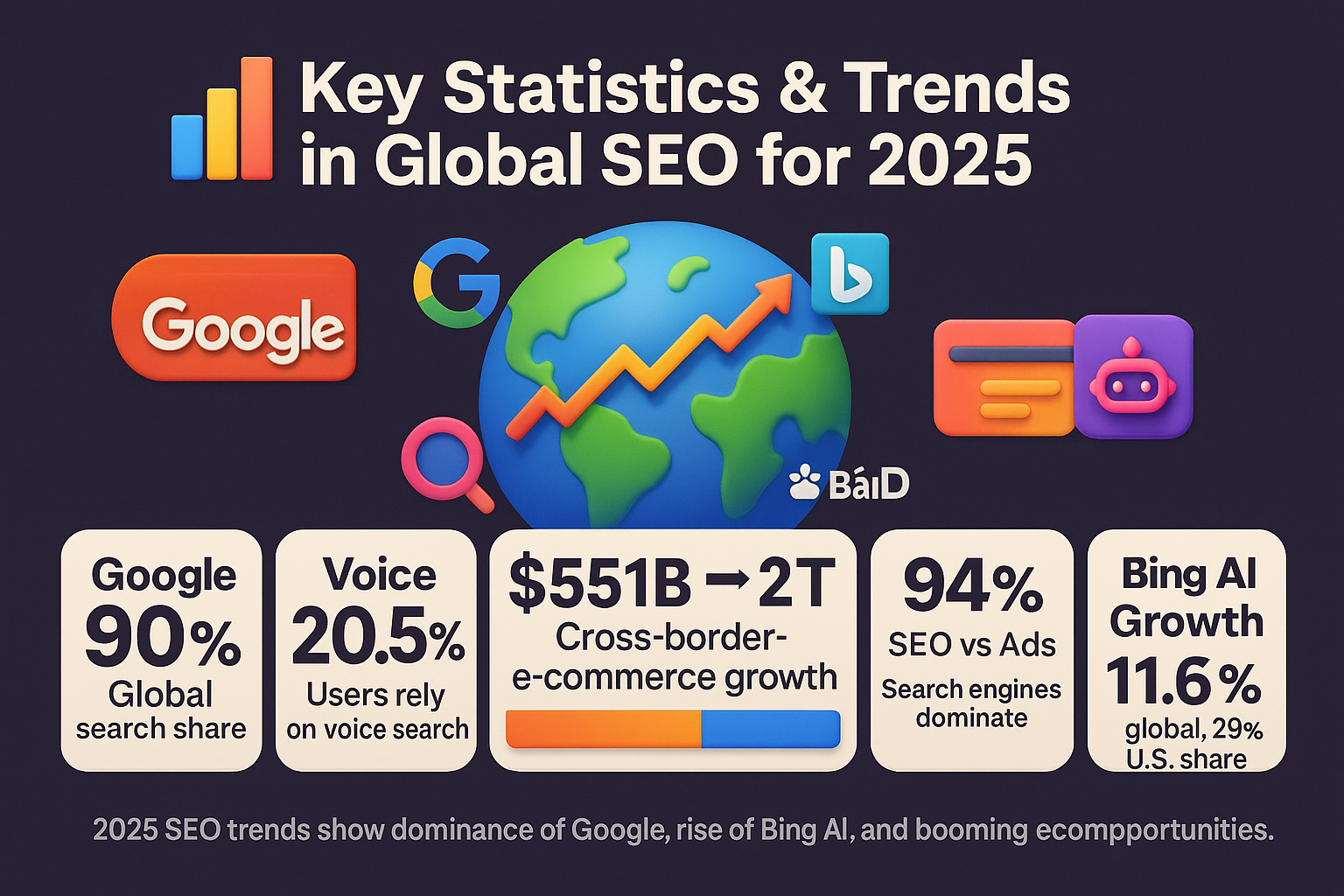
Numbers tell the real story. For Chinese companies going global, knowing the latest data helps shape strategy and maximize investment. Below are the pivotal global SEO statistics for 2025 and trends backed by trusted sources:
- Search engine dominance: Google remains king with nearly 90% of global search traffic, while Bing captures around 4%, and Baidu only about 0.76%.
- Voice search growth: Globally, about 20.5% of people use voice search, highlighting a shift toward conversational queries.
- Cross-border e-commerce boom: The global cross-border e-commerce market is valued at $551 billion in 2025, projected to reach $2 trillion by 2034.
- E-commerce scale: Worldwide B2C e-commerce is expected to surpass $6.8 trillion in 2025, with 52% of online shoppers buying from overseas brands.
- SEO vs Ads channels: Google and Bing together control 94% of global search share, emphasizing where SEO efforts should focus.
- AI in search: Bing’s AI integrations have boosted its global desktop search share to 11.6% and U.S. share to 29%.
Trend Highlights for 2025
Localization matters: Consumers prefer local language, pricing, and user experience.
E-A-T (Expertise, Authoritativeness, Trust): High-quality, credible content improves rankings.
Tech adoption: AI tools are now widely used in keyword research and performance tracking.
These figures show why a global SEO strategy China can trust is vital. Ignoring them risks wasted effort, while adapting early can unlock billions in new markets.
Case Studies of Chinese Brands Using Global
Many Chinese companies have already demonstrated the power of international SEO for Chinese brands. Their stories highlight the difference between relying only on Baidu and adopting a global SEO strategy that China can apply worldwide. Below are three examples of brands that used SEO and digital strategy to build recognition far beyond their home market.
Shein – Fast Fashion’s SEO-Driven Global Takeover
Shein is one of the fastest-growing e-commerce brands in the world. In 2022, it became the most downloaded shopping app in the U.S., even surpassing Amazon. By 2023, Shein’s revenue reached $30 billion, with organic search contributing a major share of traffic.
Their website ranks for 10 million+ keywords worldwide, including English, Spanish, and French phrases. On Google U.S. alone, Shein receives an estimated 160 million monthly visits, much of it organic. Their strategy focused on localized landing pages and keyword targeting like “cheap summer dresses” in the U.S. and “affordable fashion online” in Europe. This localized SEO content created sustainable global visibility without depending entirely on paid ads.

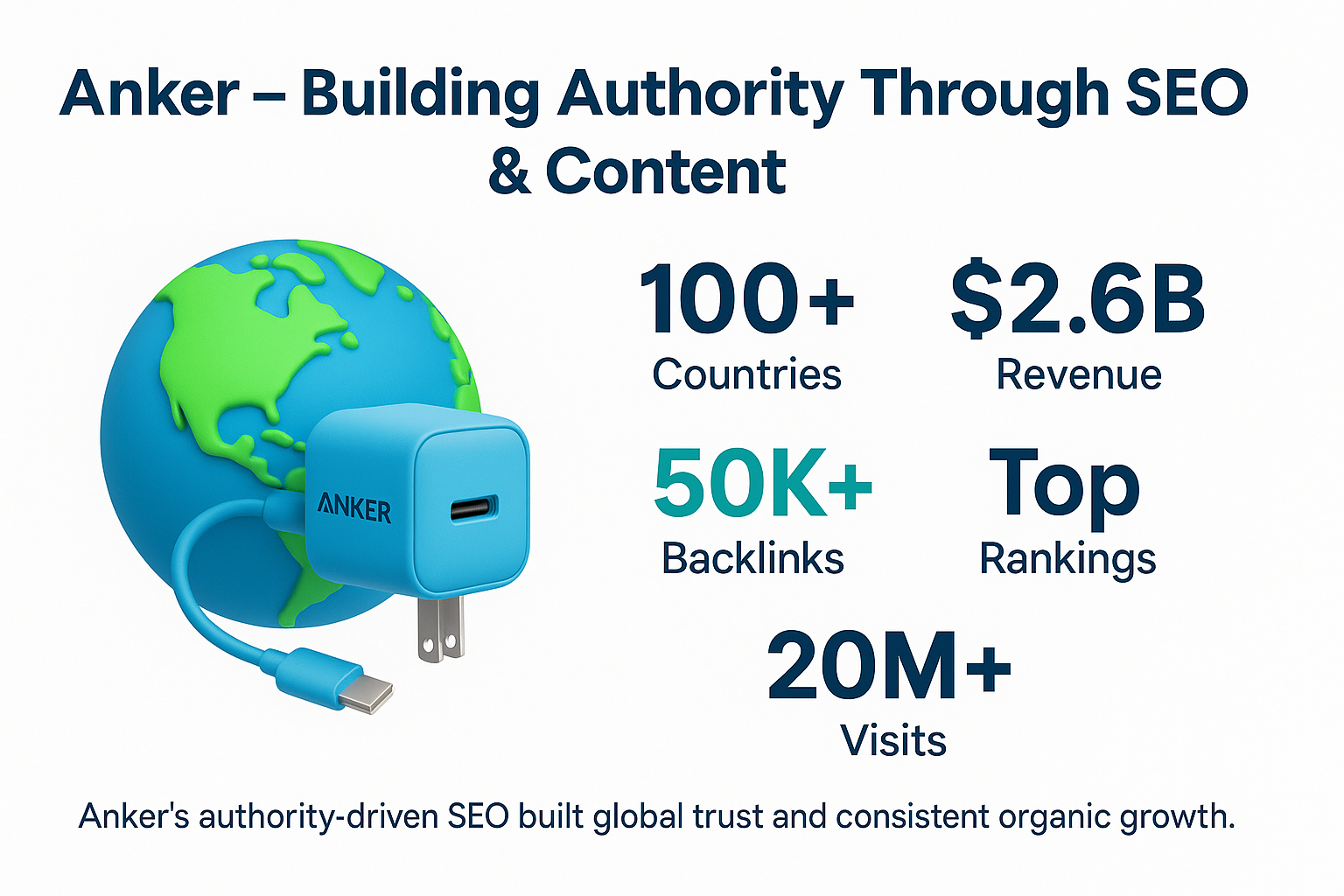
Anker – Building Authority Through SEO and Content
Anker has become a global leader in electronics and accessories. By 2024, Anker products sold in 100+ countries generated over $2.6 billion in revenue. Much of their visibility came from international content marketing and SEO.
Anker earned 50,000+ backlinks from authority domains like CNET, Wired, and The Verge. These links boosted Google trust signals, helping their website rank for high-value keywords such as “best portable charger” and “USB-C hub.” On Amazon U.S., Anker dominates product searches, ranking organically in the top 3 results for multiple categories. Their site receives more than 20 million global monthly visits, fueled by SEO and content authority.
Huawei – From Domestic Leader to Global Competitor
Huawei has invested heavily in international visibility. Despite political challenges, the company reported $99 billion in global revenue in 2023, with digital presence playing a key role.
Huawei optimized websites for 170+ countries, each localized with product pages, support hubs, and news content. By implementing hreflang tags, they improved rankings for multilingual searches across Europe and the Middle East. In 2024, Huawei’s main site attracted 80 million monthly visits globally, much of it from organic Google searches. Their whitepapers, technical blogs, and research content also earned over 250,000 backlinks, strengthening brand authority.
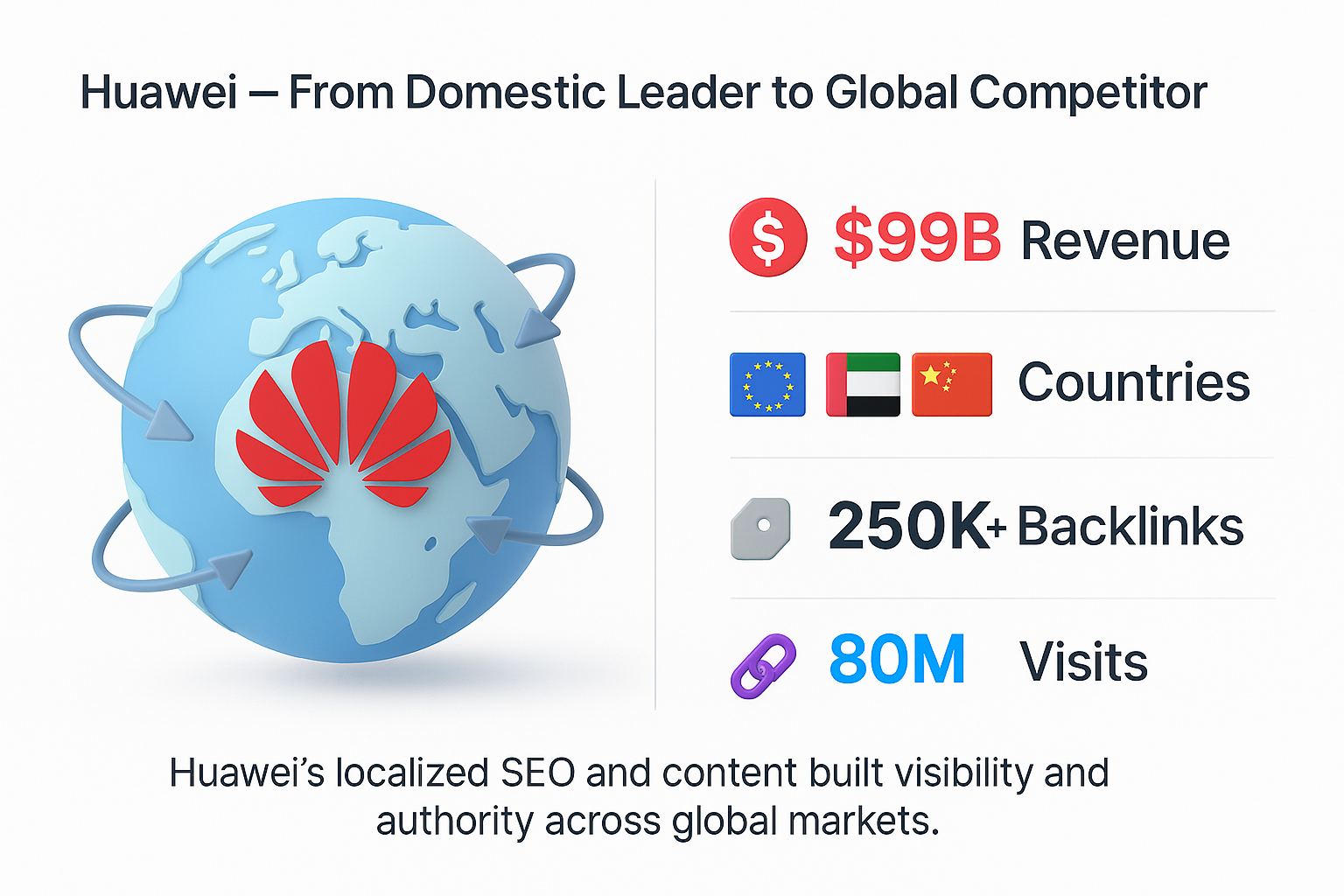
Lessons for Chinese Brands
These examples highlight that cross-border SEO success comes from more than translation:
Shein proves the scale of localized keywords and global landing pages, driving billions in sales.
Anker shows the power of authority backlinks and optimized product content.
Huawei demonstrates the impact of technical SEO and localized PR strategies.
Comparison of Global SEO Approaches
| Brand | Traffic / Reach | Key SEO Focus | Results |
|---|---|---|---|
| Shein | 160M+ monthly organic visits (U.S. Google) | Localized keywords, landing pages | $30B+ revenue, dominant fashion brand globally |
| Anker | 20M+ monthly site visits, 50K backlinks | Authority content, cross-border e-commerce SEO | $2.6B revenue, top Amazon rankings |
| Huawei | 80M monthly global visits, 250K backlinks | Technical SEO, localized PR, hreflang setup | $99B revenue, visibility in 170+ countries |
Chinese companies that adopt a global SEO strategy can replicate these results in China. The path is clear: invest in localized content, authority backlinks, and technical SEO to compete internationally.
Why aboveA Is the Right SEO Partner?
Expanding outside China is not just about shifting from Baidu to Google. It requires a partner who understands both worlds. This is where aboveA comes in. The agency specializes in building international SEO for Chinese brands, combining strategy, execution, and global market knowledge.
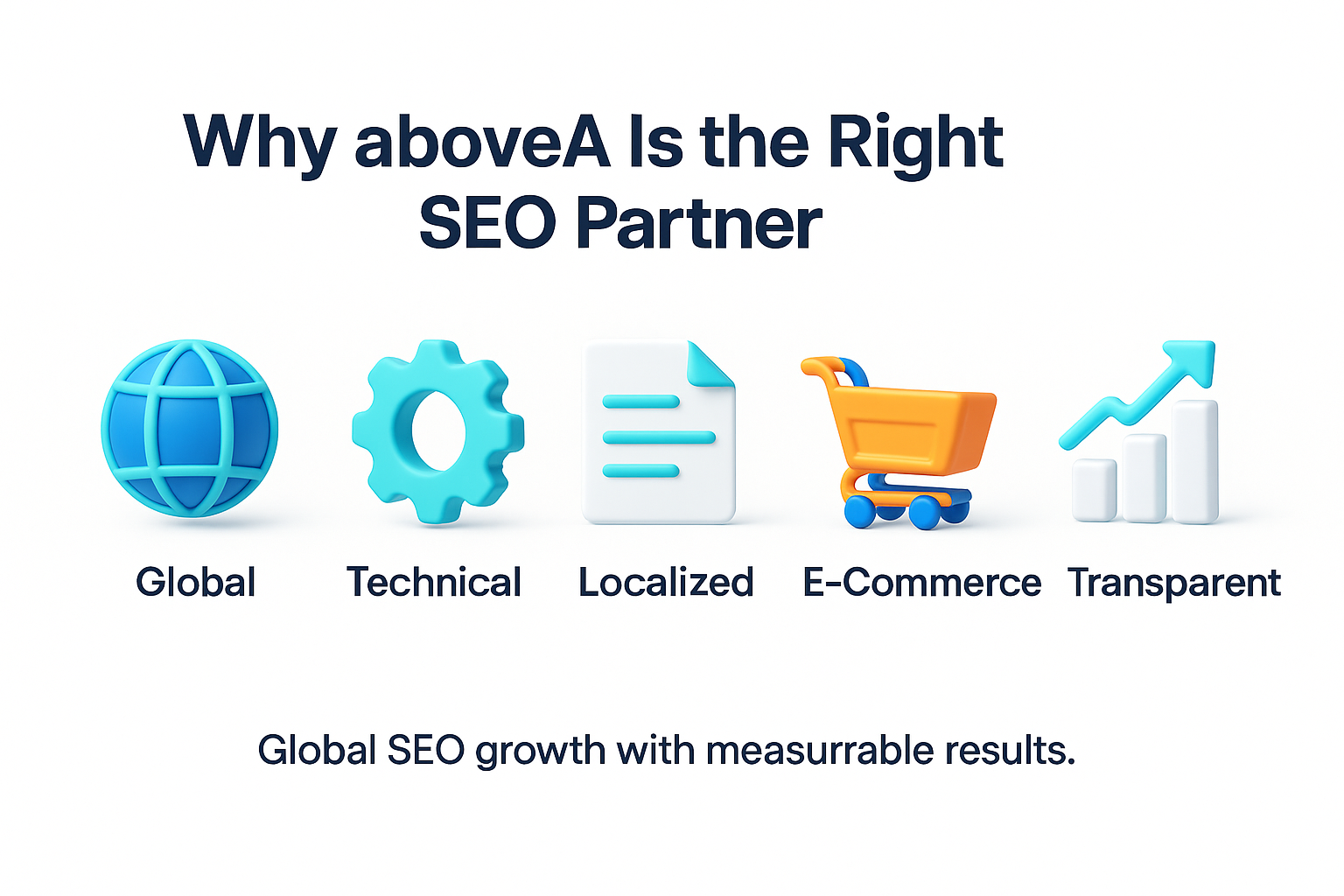
Expertise in Global SEO Strategy
Most agencies focus only on ads or short-term campaigns, but aboveA builds a global SEO strategy China can rely on for sustainable growth. Their team is fully remote, with specialists across Asia, Europe, and North America. This structure allows them to design campaigns tailored for local search engines, cultural expectations, and buyer behavior.
Key strengths include:
International keyword research – finding what global customers actually search for in English, Spanish, French, and more.
Technical SEO setup – ensuring sites use hreflang tags, structured data, and mobile-first design.
Localized content strategies – creating blogs, guides, and product pages that rank naturally in each region.
Cross-border e-commerce SEO – optimizing Amazon, Lazada, and Shopify stores for higher visibility.
This approach ensures that Chinese brands do not just appear abroad—they become competitive in each target market.
Transparent, Startup-Friendly Approach
Another reason aboveA is a strong SEO partner for global growth is their transparency. Many agencies overpromise and underdeliver, leaving clients unsure of progress. aboveA provides structured deliverables, clear reporting, and realistic timelines, making them a trusted choice for startups and established firms alike.
Their work goes beyond SEO. By combining lead generation systems, marketing automation, and user behavior strategies, aboveA helps brands scale faster and smarter. Chinese companies working with aboveA get more than rankings—they gain measurable revenue growth and a repeatable international strategy.
For businesses preparing to expand outside China in 2025, aboveA is a lean, effective alternative to traditional agencies with heavy overheads. Their mix of global expertise and data-driven execution makes them the right choice for companies serious about international success.
Conclusion: Moving Beyond Baidu
Baidu SEO works inside China, but it stops at the border. To succeed abroad, companies need international SEO for Chinese brands built around Google, Bing, and regional platforms. The key is localization, technical precision, and authority building. With the right global SEO strategy China can compete worldwide, turning visibility into real growth. aboveA helps Chinese companies bridge this gap, guiding expansion with clear deliverables and measurable results.
Frequently Asked Questions
1. Why doesn’t Baidu SEO help outside China?
Baidu’s algorithm is built for China’s internet ecosystem. It doesn’t impact rankings on Google or Bing, so Chinese companies must adopt new international SEO strategies abroad.
2. Which search engines should Chinese brands focus on globally?
Google dominates in most regions, while Bing, Yahoo Japan, and Naver matter locally. A strong global SEO strategy China can apply includes optimizing for these platforms simultaneously.
3. How can Chinese companies build SEO for cross-border e-commerce?
Brands should optimize Amazon, Shopee, and Shopify listings with localized keywords. Supporting this with blogs and guides helps drive traffic and sales through international SEO content marketing.
4. How does aboveA support Chinese brands going global?
aboveA specializes in international SEO for Chinese brands, offering localized strategies, technical SEO, and lead generation. Their transparent approach helps Chinese companies expand into global markets with measurable growth.

